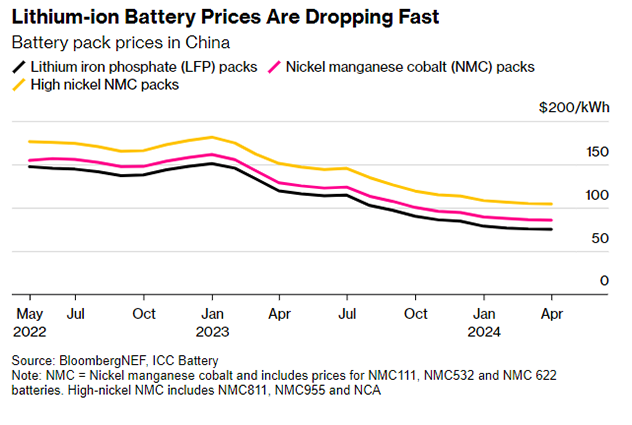How much does it cost to replace an EV battery?

“How much does an EV battery cost to replace?” is a common question asked by drivers who are considering going electric – and by those skeptical about electric cars in Australia.
And it’s a fair question – as fair as it is to ask, “How much does it cost to replace a car engine?” ;
According to Canstar, the cost to replace an engine can range from $4,500-$28,000 on average, depending on the make and model of the car.
As Canstar notes, there are a wide range of other expensive repairs for internal combustion engine (ICE) cars that don't apply to EVs, such as replacing cylinders ($8,000+), transmission repairs ($200 – $5,000+), replacing head gaskets ($1,200 – $3,000+) and camshafts ($1,200 – $1,500+).
These, plus the added maintenance and servicing costs of an ICE vehicle can all add up over the lifetime of a car. Because there are fewer moving parts, there are less costs associated with maintaining an EV.
But how much do EV batteries cost to replace? How often do EV batteries need replacing? And, how much will new EV batteries cost in the future?
Do EV batteries last longer than the warranty?
Most modern EV batteries last a lot longer than many people realise. They are designed to use sophisticated battery management software and cooling technology to ensure longevity.
The majority of car manufacturers guarantee at least 70-80% capacity after 8 years. But studies have shown degradation is commonly less than this, and EV batteries are perfectly capable of being used past this “used by date”, albeit with a slightly shorter driving range.
— Bridie Schmidt
How much is a new EV battery now?
In the rare case that an EV battery needs to be replaced, if it is under warranty the replacement cost will be covered by the manufacturer.
Early concerns about high battery replacement costs are also diminishing as the cost of making batteries drops.
In November 2023, BloombergNEF reported that the base cost of lithium-ion battery packs fell to an all-time low of $US139/kWh ($AU207/kWh at today’s rates.)
That’s 14 per cent lower than 2022, and included prices for energy storage batteries. For EV batteries, packs now cost an average of $US128/kWh. In China, where most of the EVs in Australia come from, prices are even lower: $US126/kWh ($AU188/kWh at today’s rates.)
In July, BloombergNEF reported this figure has now fallen even further. As noted in our article, 'EV prices are coming down: but how fast, and why?', the pack price for lithium-iron phosphate batteries has fallen to $US75/kWh ($A110/kWh) in April, while high-energy density nickel battery packs hover just above this number at $US104/kWh ($A153/kWh.)"
To put that in perspective, the wholesale cost of a 50kWh lithium-iron phosphate battery (the kind you will find in standard range EVs from China) is now $US3750, or a little less than $AU5521 at today’s rates.

How much will a new EV battery cost in the future?
If you’re thinking of buying a new EV today, remember that the cost to make batteries will continue to drop, and any new EV bought today will have a battery warranty until 2032 (unless they reach their kilometre limits first.)
The exceptions to these are the MG and Kia range (which have seven year warranties - so until 2031), and certain high-end luxury EVs such as the Rolls Royce Spectre, the Lexus RZ 450e, and certain Mercedes-Benz EVs, which have ten year battery warranties, so until 2034. See all the electric cars in Australia for more information.
A recent real-life example of an EV battery replacement was for a 60kWh lithium-iron-phosphate (LFP) battery made in China for a Tesla Model 3 RWD, for just under $17,000.
If we assume this was made using China battery prices ($US126/kWh, or $AU188/kWh,) this battery cost $AU11,280 wholesale - 66 per cent of the replacement cost.
Going on this logic, we can make some projections about the future costs of battery replacements using BNEF global forecasts taking into account varying countries of manufacture. Forecast values are $US133/kWh ($AU198/kWh at today’s rates) by the end of 2024, $US113/kWh ($AU169/kWh at today’s rates) in 2025 and $US80/kWh ($AU121/kWh at today’s rates) in 2030.
Projected battery replacement costs, $AU
| Battery Size (kWh) | Example Models | 2023 | 2024 | 2025 | 2030 |
| 40 | Nissan Leaf ZE1 | $12,420 | $11,880 | $10,140 | $7,260 |
| 51 | BYD Atto 3 SR*, MG MG4 51kWh* | $15,836 | $15,147 | $12,929 | $9,257 |
| 60 | Tesla Model 3 RWD*, BYD Atto ER* | $18,630 | $17,820 | $15,210 | $10,890 |
| 64 | Hyundai Kona EV LR | $19,872 | $19,008 | $16,224 | $11,616 |
| 78 | Volvo C40
Recharge Twin |
$24,219 | $23,166 | $19,773 | $14,157 |
| 82 | Polestar Long Range Single Motor, Tesla Model 3 Long Range | $25,461 | $24,354 | $20,787 | $14,883 |
| 93 | Porsche Taycan | $28,877 | $27,621 | $23,576 | $16,880 |
| 114 | Audi SQ8 e-tron | $35,397 | $33,858 | $28,899 | $20,691 |
Calculations based on BNEF global forecasts, November 2023.
*Prices likely to be lower due to cheaper LFP prices
Sources:
- The most expensive car parts to repair | Canstar
- Lithium-Ion Battery Pack Prices Hit Record Low of $139/kWh | BloombergNEF
- China’s Batteries Are Now Cheap Enough to Power Huge Shifts | Colin McKerracher, July 9, 2024, BloombergNEF
- EV prices are coming down: but how fast, and why? | Bridie Schmidt, 16 August, 2024, The NRMA
This article was updated on 16 January, 2024 to add exceptions to EVs with eight-year battery warranties., and to clarify battery warranties often have kilometre limits.)
This article was updated on September 9, 2024, to include updated information about falling battery costs.







